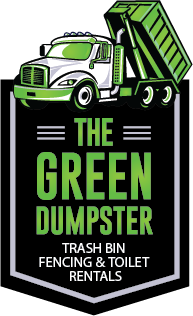Diving into a project is exciting, but dealing with the aftermath of waste and debris? Not so much. That’s where dumpster rentals save the day.
But before you dive headfirst into renting, let’s talk dumpster sizes. In this comprehensive A-Z guide, we’ll demystify everything from dimensions to cost considerations, ensuring you pick the perfect dumpster size for your project.
Key Summary
- Dumpster sizes are measured in cubic yards, representing the volume of space a dumpster can hold.
- Small dumpsters, such as the 3-yard and 9-yard options, are commonly used for remodels and renovations, as well as retail stores, restaurants, and bars.
- Medium dumpsters, like the 16-yard and 25-yard sizes, are ideal for extensive renovations.
- Large dumpsters, including the 40-yard option, are suitable for substantial projects like large-scale construction and demolition jobs.
- Choosing the right dumpster size is crucial for efficient waste management, ensuring you don’t pay for unused space or face the inconvenience of multiple trips.
Understanding Dumpster Sizes
Before diving into the specifics of dumpster sizes, it’s important to understand the dimensions and terminology commonly used in the dumpster rental industry.
Dumpsters are typically measured in cubic yards, which refers to the amount of space a dumpster can hold. The dimensions of a dumpster, including length, width, and height, determine its overall capacity.
Types of Dumpster Sizes
When it comes to choosing the right dumpster size for your project, having options is key. At The Green Dumpster, we offer a range of dumpster sizes tailored to meet the diverse needs of our customers. Let’s explore your options:
- Ideal for retail stores, restaurants, bars, auto repair shops, and medical and dental offices. It’s also great for small-scale cleanouts, such as decluttering a garage or disposing of yard waste.
- Capacity and Dimensions: Compact yet efficient, with dimensions typically around 6 feet in length, 4 feet in width, and 4 feet in height.
- Projects: Household cleanouts, landscaping projects, and minor renovations.
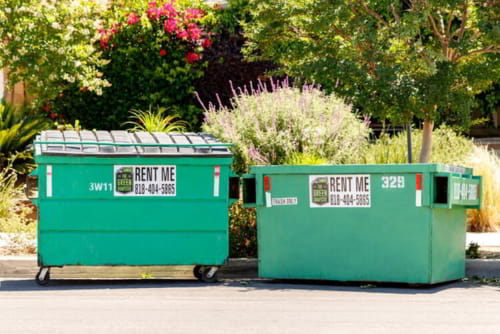
- Perfect for medium-sized remodels, commercial office spaces, and residential complexes.
- Capacity and Dimensions: Providing more room than its smaller counterpart, with dimensions typically around 10 feet in length, 6 feet in width, and 4 feet in height.
- Projects: Basement or attic cleanouts, home renovations, and office remodeling.
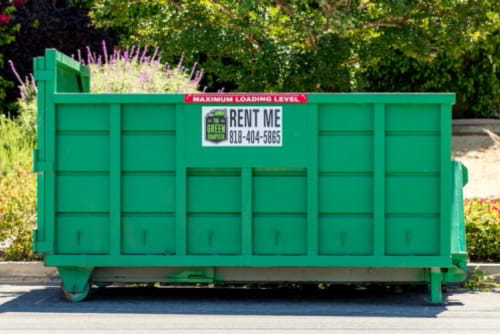
- A versatile and popular choice for major residential remodels, large commercial spaces, community events, and small schools.
- Capacity and Dimensions: Offering ample space without overwhelming constraints, with dimensions typically around 18 feet in length, 8 feet in width, and 2 feet in height.
- Projects: Small to medium-sized remodeling projects, and landscaping debris removal.
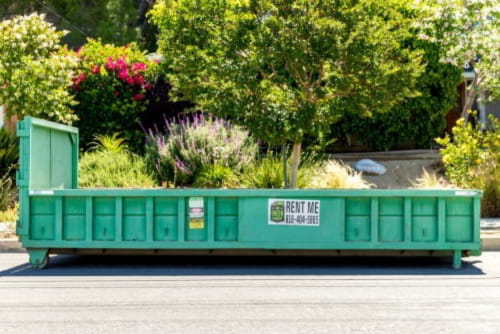
- Stepping up in size, suitable for extensive residential renovations, complete restaurant overhauls, and large schools.
- Capacity and Dimensions: Providing increased capacity while remaining manageable, with dimensions typically around 14 feet in length, 8 feet in width, and 4 feet in height.
- Projects: Major household cleanouts and renovations, medium-sized construction or demolition projects, and roofing replacements.
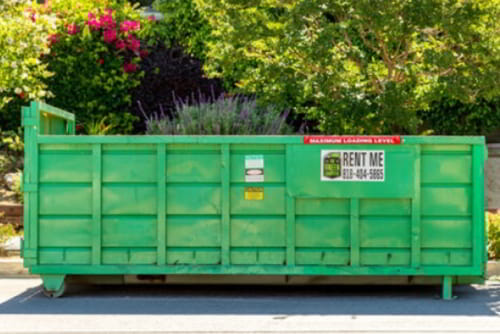
- Designed for substantial projects, offering ample space for full-scale commercial remodels, residential complex revamps, and extensive residential renovations.
- Capacity and Dimensions: Offering significant capacity while still being manageable, with dimensions typically around 15 feet in length, 8 feet in width, and 6 feet in height.
- Projects: Whole-home cleanouts, large-scale remodeling or renovation projects, and commercial construction debris removal.
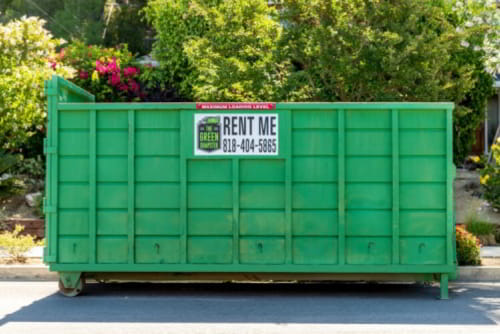
- Ideal for major construction projects, commercial renovations, infrastructure upgrades, and large medical and educational spaces.
- Capacity and Dimensions: Providing vast capacity to handle even the most substantial projects, with dimensions typically around 22 feet in length, 8 feet in width, and 6 feet in height.
- Projects: Large-scale construction or demolition projects, commercial building cleanouts, and major renovation projects.
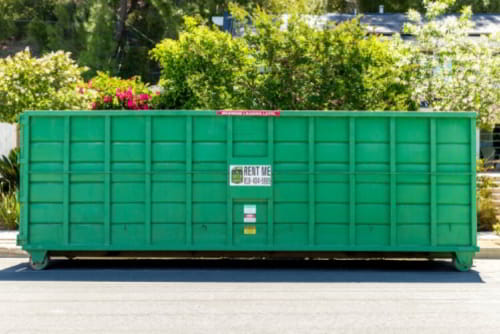
Comprehensive Dumpster Size Chart
To help you visualize and compare the different dumpster sizes available, refer to the comprehensive dumpster size chart below.
| Dumpster Size | Dimensions (Length x Width x Height) | Capacity (Cubic Yards) | Approximate Trash Bags |
|---|---|---|---|
| 3-Yard | 6' x 4' x 4’ | 3 | 200-300 |
| 9-Yard | 10' x 6' x 4' | 9 | 600-900 |
| 10-Yard | 18' x 8' x 2' | 10 | 1,000-1,300 |
| 16-Yard | 14' x 8' x 4' | 16 | 1,300 |
| 25-Yard | 15' x 8' x 6' | 25 | 2,100 |
| 40-Yard | 22' x 8' x 6' | 40 | 3,400 |
Determining the Right Dumpster Size for Your Project
Now that you have a better understanding of the different dumpster sizes available, it’s time to determine the perfect fit for your project. Here are some factors to consider:
Assessing the Scope and Scale of Your Project
Start by evaluating the scope and scale of your project. Consider the type of waste you will be disposing of and the estimated amount.
For larger projects, it’s always better to err on the side of caution and choose a slightly larger dumpster to avoid the hassle of multiple trips or overfilled containers.
Estimating the Volume of Waste Generated
To estimate the volume of waste generated, visualize the amount of debris and waste produced by your project. Take into account the type of materials involved, such as construction debris or household items. Here’s a step-by-step guide on how to measure cubic yards:
- Gather Measurements: Start by measuring the length, width, and height of the pile or area where waste will accumulate. Use a tape measure for accuracy.
- Convert Measurements: Ensure all measurements are in the same units (e.g., feet). If necessary, convert inches to feet.
- Calculate Volume: Multiply the length, width, and height measurements together to calculate the volume in cubic feet. The formula is: Volume (cubic feet) = Length (feet) x Width (feet) x Height (feet).
- Convert to Cubic Yards: Since dumpster sizes are typically measured in cubic yards, you’ll need to convert the volume from cubic feet to cubic yards. Divide the volume in cubic feet by 27 to get the volume in cubic yards (since 1 cubic yard equals 27 cubic feet).
- Round Up: It’s advisable to round up to the nearest whole number when estimating your dumpster size to ensure you have enough space to accommodate all waste comfortably.
Considering Space Limitations and Accessibility
Evaluate the space available at your project site for dumpster placement.
Ensure that there is enough room for the dimensions of the chosen dumpster and that it can be easily accessed by the rental company for drop-off and pick-up. Consider any potential obstacles, such as trees or utility lines, that may hinder placement.
Consulting with Dumpster Rental Companies for Recommendations
Don’t hesitate to consult with us for our expert recommendations. We have extensive experience in matching the right dumpster size to various projects and can provide valuable insights based on your specific needs.
Tips for Renting the Right Size Dumpster
Planning Ahead to Avoid Last-Minute Decisions
Plan your project timeline and schedule the dumpster rental in advance. Last-minute decisions may limit your options for available dumpster sizes and result in unnecessary delays. By planning ahead, you can secure the perfect dumpster size for your project.
Communicating with the Rental Company About Your Specific Needs
Provide detailed information about your project to us. Discuss the type of waste, estimated volume, and any specific requirements you may have. Clear communication ensures that we can recommend the most suitable dumpster size to meet your needs.
Asking Questions about Weight Limits, Rental Duration, and Pricing
Different dumpster sizes may have varying weight restrictions, and rental duration can impact the overall cost. Understanding these details upfront will help you make an informed decision.
Checking Local Regulations and Permit Requirements for Dumpster Placement
Before renting a dumpster, familiarize yourself with local regulations and permit requirements for dumpster placement. Some areas may have restrictions or require permits for placing dumpsters on public property. Checking these regulations in advance will help you avoid any legal issues.
Cost Considerations
When it comes to dumpster rentals, cost is an important aspect to consider. Here are some factors that influence dumpster rental prices:
- Dumpster size: Larger dumpsters generally come at a higher cost than smaller ones.
- Location: Prices may vary depending on your location and proximity to the rental company. Be sure to look at the cities we serve to find a reliable dumpster rental near you.
- Rental duration: The length of your rental period can influence the overall cost.
Average Cost Range for Different Dumpster Sizes
The average cost range for different dumpster sizes can vary depending on the factors mentioned above.
At The Green Dumpster, small dumpsters (10-15 cubic yards) cost around $500 for a weekly rental, medium dumpsters (20-30 cubic yards) range around $615, and large dumpsters (40 cubic yards) can cost around $715.
Frequently Asked Questions
What are standard dumpster sizes?
Standard dumpster sizes range from 3 to 40 cubic yards.
What is the most common size dumpster rental?
The most common size dumpster rental is the 20 cubic yard dumpster, which is suitable for a wide range of residential and commercial projects.
What is the measurement of a 10-yard dumpster?
Our 10-yard dumpster measures approximately 18’00” x 8’00” x 2’00”.
How big is an 8-yard bin?
An 8-yard bin is slightly smaller than a 10-yard dumpster and typically measures around 10 feet in length, 6 feet in width, and 4 feet in height.
Finding the Perfect Fit for Your Dumpster Rental
Choosing the right dumpster size is crucial for a successful waste management experience. By understanding the dimensions, terminology, and factors influencing the selection of dumpster sizes, you can make an informed decision for your project.
Assess the scope and scale of your project, estimate the volume of waste generated, consider space limitations, and consult with rental companies for recommendations.
By following these steps and considering cost considerations, you can find the perfect fit for your dumpster rental. So, when you’re ready to rent a dumpster, contact us for reliable and efficient waste disposal solutions!
